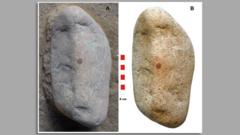One of the most substantial archaeological discoveries in recent British history has emerged from a rural site near the village of Melsonby, North Yorkshire. The Melsonby Hoard, consisting of more than 800 items primarily from the Iron Age, has been quietly unearthed since its initial discovery by amateur metal detectorist Peter Heads in December 2021. Headed by Tom Moore, the director of the University of Durham’s Archaeology department, the three-year excavation was conducted in secrecy before its recent public reveal.
This treasure trove, which includes artifacts such as cauldrons, wine-mixing bowls, coral-coated horse harnesses, ceremonial spears, and a remarkable collection of 28 iron wheels, is poised to reshape historians' insights into life during the Iron Age, roughly 2,000 years ago. Duncan Wilson, chief executive of Historic England, emphasized the importance of the find, noting that it not only enhances our understanding of Iron Age existence in Britain but also suggests connections with European cultures of the time, highlighting the sophistication and far-reaching trade networks of the era.
The innovative nature of the iron wheels suggests a level of transportation capability previously unrecognized among the elite of Iron Age Britain, prompting a reevaluation of social and economic interactions that may have occurred. As this find continues to provide crucial insights, archaeologists are eager to further study the implications of the Melsonby Hoard on historical narratives surrounding early British civilization.
This treasure trove, which includes artifacts such as cauldrons, wine-mixing bowls, coral-coated horse harnesses, ceremonial spears, and a remarkable collection of 28 iron wheels, is poised to reshape historians' insights into life during the Iron Age, roughly 2,000 years ago. Duncan Wilson, chief executive of Historic England, emphasized the importance of the find, noting that it not only enhances our understanding of Iron Age existence in Britain but also suggests connections with European cultures of the time, highlighting the sophistication and far-reaching trade networks of the era.
The innovative nature of the iron wheels suggests a level of transportation capability previously unrecognized among the elite of Iron Age Britain, prompting a reevaluation of social and economic interactions that may have occurred. As this find continues to provide crucial insights, archaeologists are eager to further study the implications of the Melsonby Hoard on historical narratives surrounding early British civilization.




















